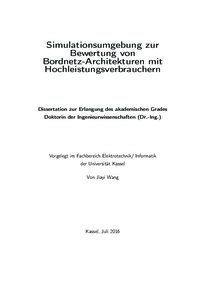Dissertation

Simulationsumgebung zur Bewertung von Bordnetz-Architekturen mit Hochleistungsverbrauchern
Zusammenfassung
Die vorliegende Arbeit untersucht die Bordnetzstabilität konventioneller und erweiterter automobiler Bordnetz-Architekturen beim Betrieb mit Hochleistungsverbrauchern. Wesentliches Ziel der Dissertation ist daher die Entwicklung einer modularen Simulationsumgebung, die die Bewertung von Bordnetz-Architekturen und -Konfigurationen ermöglicht. Methodisch werden dazu zunächst mathematisch/ physikalische Simulationsmodelle der Bordnetzkomponenten erstellt und anschließend in eine dynamische Gesamtbordnetzsimulation integriert. Anhand einer Versuchsplanung werden anschließend systematische Bordnetzsimulationen durchgeführt und hinsichtlich Ladezustand, Bordnetzarchitektur und Grundlast für den Betrieb mit Hochleistungsverbrauchern bewertet.
Es wird deutlich, dass erweiterte Bordnetzarchitekturen die Bordnetzstabilität verbessern. Es kann gezeigt werden, dass 300F Doppelschichtkondensatoren gegenüber 30F Doppelschichtkondensatoren kapazitätsbezogen geringere relative Verbesserungen aufweisen. Weiterhin wird deutlich, dass ein Batterieladezustand von 100% gegenüber einem Batterieladezustand von 80% zu einer schlechteren Bordnetzstabilität führen kann und dass eine langsame DC-DC-Wandler Regelung Bordnetzteile stärker entkoppelt als eine schnelle Regelung.
Es wird deutlich, dass erweiterte Bordnetzarchitekturen die Bordnetzstabilität verbessern. Es kann gezeigt werden, dass 300F Doppelschichtkondensatoren gegenüber 30F Doppelschichtkondensatoren kapazitätsbezogen geringere relative Verbesserungen aufweisen. Weiterhin wird deutlich, dass ein Batterieladezustand von 100% gegenüber einem Batterieladezustand von 80% zu einer schlechteren Bordnetzstabilität führen kann und dass eine langsame DC-DC-Wandler Regelung Bordnetzteile stärker entkoppelt als eine schnelle Regelung.
The present thesis examines the electrical system stability of conventional and advanced automotive electrical systems when operating with high power consumers. The main objective of the thesis therefore is the development of a modular simulation environment for evaluating electrical system architectures and configurations.
Methodically mathematical / physical simulation models of the vehicles electrical system components are first developed and then integrated into an overall dynamic electrical system simulation. Based on statistical experimental design, simulations are carried out and analyzed regarding state-of-charge, vehicle electrical system architecture and base load for operation with high power consumers.
Obviously enhanced electrical system architectures improve the electrical system stability. It can be shown that 30F double layer capacitors compared to 300F double layer capacitors lead to much larger relative improvements, related to capacity. Furthermore, it gets obvious that a battery state of charge of 100% compared to 80% can cause worse electrical system stability and that a slowly controlled DC-DC converter decouples parts of the vehicles electrical system more than a fast DC-DC converter.
Methodically mathematical / physical simulation models of the vehicles electrical system components are first developed and then integrated into an overall dynamic electrical system simulation. Based on statistical experimental design, simulations are carried out and analyzed regarding state-of-charge, vehicle electrical system architecture and base load for operation with high power consumers.
Obviously enhanced electrical system architectures improve the electrical system stability. It can be shown that 30F double layer capacitors compared to 300F double layer capacitors lead to much larger relative improvements, related to capacity. Furthermore, it gets obvious that a battery state of charge of 100% compared to 80% can cause worse electrical system stability and that a slowly controlled DC-DC converter decouples parts of the vehicles electrical system more than a fast DC-DC converter.
Zitieren
@phdthesis{urn:nbn:de:hebis:34-2017100253538,
author={Wang, Jiayi},
title={Simulationsumgebung zur Bewertung von Bordnetz-Architekturen mit Hochleistungsverbrauchern},
school={Kassel, Universität Kassel, Fachbereich Elektrotechnik / Informatik},
month={10},
year={2017}
}
0500 Oax
0501 Text $btxt$2rdacontent
0502 Computermedien $bc$2rdacarrier
1100 2017$n2017
1500 1/ger
2050 ##0##urn:nbn:de:hebis:34-2017100253538
3000 Wang, Jiayi
4000 Simulationsumgebung zur Bewertung von Bordnetz-Architekturen mit Hochleistungsverbrauchern / Wang, Jiayi
4030
4060 Online-Ressource
4085 ##0##=u http://nbn-resolving.de/urn:nbn:de:hebis:34-2017100253538=x R
4204 \$dDissertation
4170
5550 {{Kraftwagen}}
5550 {{Bordnetz}}
7136 ##0##urn:nbn:de:hebis:34-2017100253538
<resource xsi:schemaLocation="http://datacite.org/schema/kernel-2.2 http://schema.datacite.org/meta/kernel-2.2/metadata.xsd"> 2017-10-02T09:21:08Z 2017-10-02T09:21:08Z 2017-10-02 urn:nbn:de:hebis:34-2017100253538 http://hdl.handle.net/123456789/2017100253538 ger Urheberrechtlich geschützt https://rightsstatements.org/page/InC/1.0/ Hochleistungsverbraucher Simulation Bordnetz Bordnetz-Architekturen Bordnetzstabilität 620 Simulationsumgebung zur Bewertung von Bordnetz-Architekturen mit Hochleistungsverbrauchern Dissertation Die vorliegende Arbeit untersucht die Bordnetzstabilität konventioneller und erweiterter automobiler Bordnetz-Architekturen beim Betrieb mit Hochleistungsverbrauchern. Wesentliches Ziel der Dissertation ist daher die Entwicklung einer modularen Simulationsumgebung, die die Bewertung von Bordnetz-Architekturen und -Konfigurationen ermöglicht. Methodisch werden dazu zunächst mathematisch/ physikalische Simulationsmodelle der Bordnetzkomponenten erstellt und anschließend in eine dynamische Gesamtbordnetzsimulation integriert. Anhand einer Versuchsplanung werden anschließend systematische Bordnetzsimulationen durchgeführt und hinsichtlich Ladezustand, Bordnetzarchitektur und Grundlast für den Betrieb mit Hochleistungsverbrauchern bewertet. Es wird deutlich, dass erweiterte Bordnetzarchitekturen die Bordnetzstabilität verbessern. Es kann gezeigt werden, dass 300F Doppelschichtkondensatoren gegenüber 30F Doppelschichtkondensatoren kapazitätsbezogen geringere relative Verbesserungen aufweisen. Weiterhin wird deutlich, dass ein Batterieladezustand von 100% gegenüber einem Batterieladezustand von 80% zu einer schlechteren Bordnetzstabilität führen kann und dass eine langsame DC-DC-Wandler Regelung Bordnetzteile stärker entkoppelt als eine schnelle Regelung. The present thesis examines the electrical system stability of conventional and advanced automotive electrical systems when operating with high power consumers. The main objective of the thesis therefore is the development of a modular simulation environment for evaluating electrical system architectures and configurations. Methodically mathematical / physical simulation models of the vehicles electrical system components are first developed and then integrated into an overall dynamic electrical system simulation. Based on statistical experimental design, simulations are carried out and analyzed regarding state-of-charge, vehicle electrical system architecture and base load for operation with high power consumers. Obviously enhanced electrical system architectures improve the electrical system stability. It can be shown that 30F double layer capacitors compared to 300F double layer capacitors lead to much larger relative improvements, related to capacity. Furthermore, it gets obvious that a battery state of charge of 100% compared to 80% can cause worse electrical system stability and that a slowly controlled DC-DC converter decouples parts of the vehicles electrical system more than a fast DC-DC converter. open access Wang, Jiayi Kassel, Universität Kassel, Fachbereich Elektrotechnik / Informatik Brabetz, Ludwig (Prof. Dr.) Linnemann, Arno (Prof. Dr.) Kraftwagen Bordnetz 2017-07-07 </resource>
Die folgenden Lizenzbestimmungen sind mit dieser Ressource verbunden:
Urheberrechtlich geschützt

